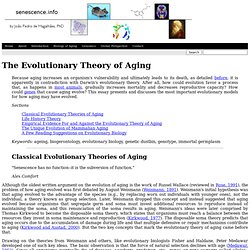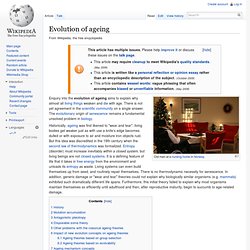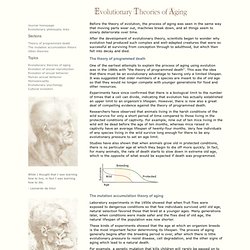

Why We Age - Aging Theories - Understanding Aging Theories. Aging is a complex process that researchers are only now beginning to understand.

There are many theories of aging and many descriptions of what aging does to our bodies. The reality is that all of these processes interact in a complex way. By understanding aging theories and why we age, we can better take action to age in a healthy way and live longer. Understanding the Aging ProcessDo you ever wonder what's happening in your body as you get older? Find out the theories about how we age, and what changes you can expect to see in a variety of bodily systems. How Fast Do We Age? Cortisol and LongevityFind out how the stress hormone cortisol can affect your longevity.
Why We Age -- Theories and Effects of AgingAging is a complex process that researchers are only now beginning to understand. Telomeres and Aging - Understanding Cellular AgingTelomeres are a DNA sequence that appears at the end of each chromosome. What is Epidemiology? What is Aging? Telomere Shortening - The Secret to Aging? Anti-Aging. The Evolutionary Theory of Aging and Life History Theory. Because aging increases an organism's vulnerability and ultimately leads to its death, as detailed before, it is apparently in contradiction with Darwin's evolutionary theory.

After all, how could evolution favor a process that, as happens in most animals, gradually increases mortality and decreases reproductive capacity? How could genes that cause aging evolve? This essay presents and discusses the most important evolutionary models for how aging may have evolved. Sections Classical Evolutionary Theories of AgingLife History TheoryEmpirical Evidence For and Against the Evolutionary Theory of AgingThe Unique Evolution of Mammalian AgingA Few Reading Suggestions on Evolutionary Biology Keywords: ageing, biogerontology, evolutionary biology, genetic dustbin, genotype, immortal germplasm Classical Evolutionary Theories of Aging "Senescence has no function--it is the subversion of function. " Another important work was the antagonistic pleiotropy model of George Williams. Aging Info - Resources and Theories on Biological Aging.
Evolutionary theories of aging and longevity. Longevity Science: Unraveling the Secrets of Human Longevity & A. The Evolution of Ageing. Species differences in longevity (e.g., why does a mouse cannot live more than 5 years yet humans can live over 100?) Remains a major puzzle of biology. The data in our AnAge database is ideal to study the evolution of longevity and ageing in vertebrate lineages. Our aim in this project is therefore to study the events, including genetic changes, shaping longevity in different lineages to help understand why different species age at different paces. For example, below is the phylogenetic tree of mammals with the average maximum longevity (in blue) of each major mammalian clade.
Senescence and the Biology of Human Aging. Evolution of ageing. Enquiry into the evolution of ageing aims to explain why almost all living things weaken and die with age.

There is not yet agreement in the scientific community on a single answer. The evolutionary origin of senescence remains a fundamental unsolved problem in biology. Historically, ageing was first likened to "wear and tear": living bodies get weaker just as with use a knife's edge becomes dulled or with exposure to air and moisture iron objects rust. But this idea was discredited in the 19th century when the second law of thermodynamics was formalized. Entropy (disorder) must increase inevitably within a closed system, but living beings are not closed systems. History[edit] August Weismann was responsible for interpreting and formalizing the mechanisms of Darwinian evolution in a modern theoretical framework. Mutation accumulation[edit] The first modern, successful theory of mammal aging was formulated by Peter Medawar in 1952.
Medawar's theory is referred to as Mutation Accumulation. Philosophy of Evolution - Evolutionary Theories of Aging. Before the theory of evolution, the process of aging was seen in the same way that moving parts wear out, machines break down, and all things seem to slowly deteriorate over time.

After the development of evolutionary theory, scientists began to wonder why evolution had produced such complex and well-adapted creatures that were so successful at surviving from conception through to adulthood, but which then fell into decay and died. The theory of programmed death One of the earliest attempts to explain the process of aging using evolution was in the 1880s with "the theory of programmed death". This was the idea that there must be an evolutionary advantage to having only a limited lifespan. It was suggested that older members of a species are meant to die of old age so that they would no longer compete with younger generations for food and other resources.